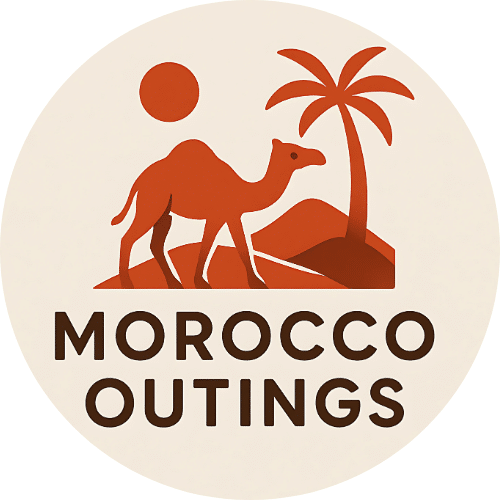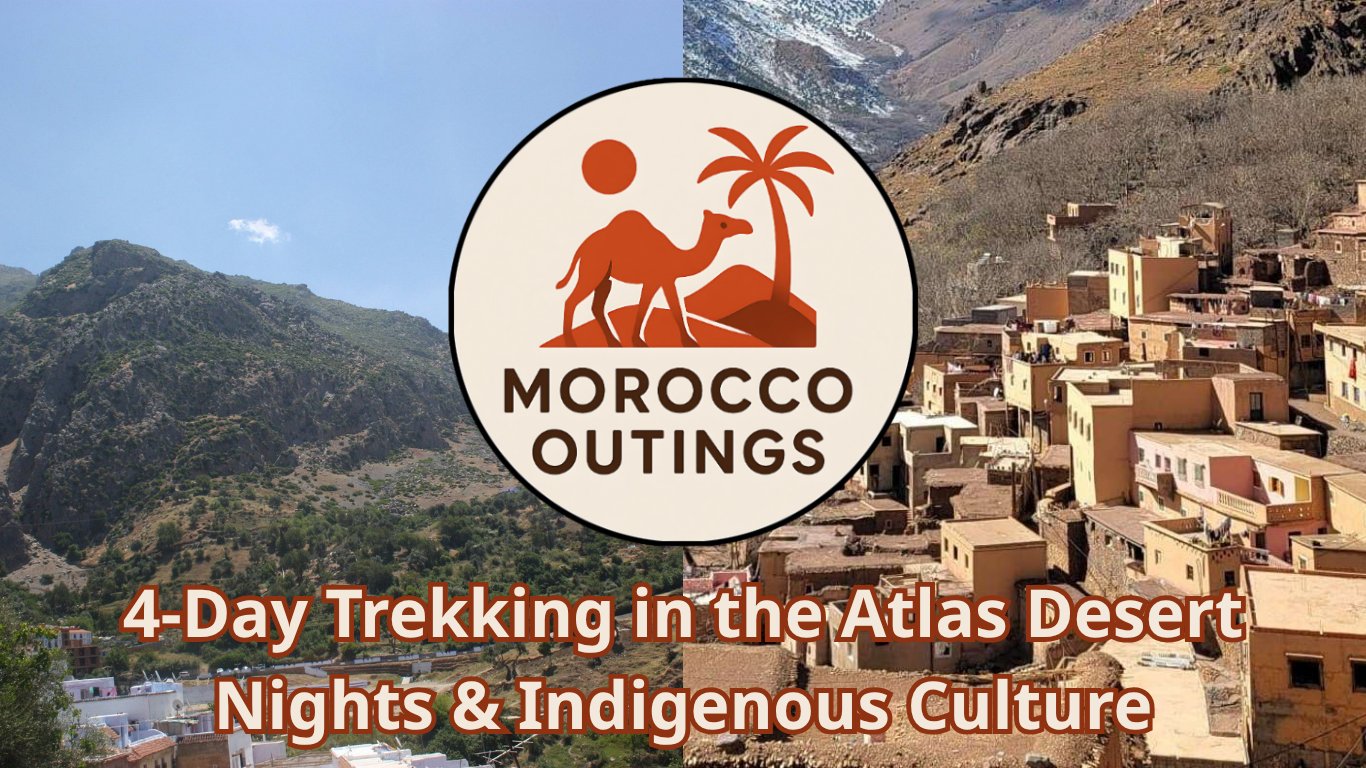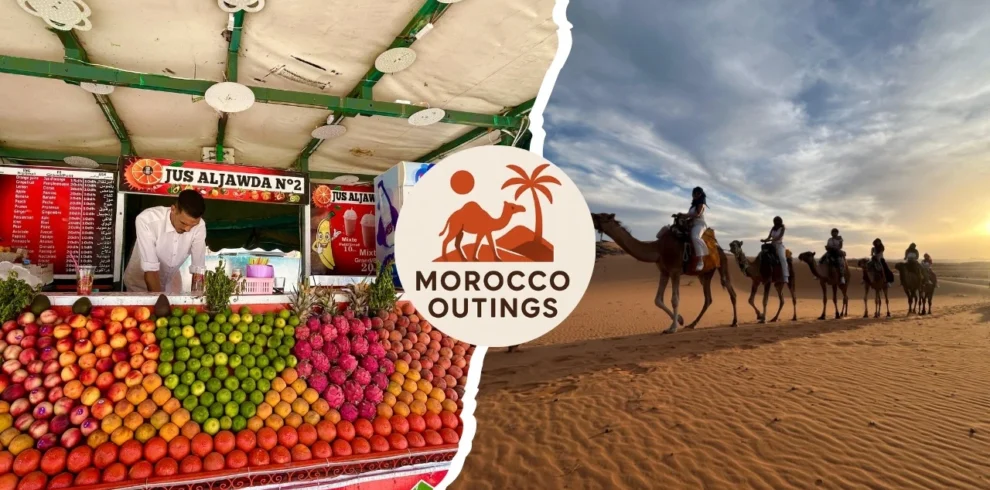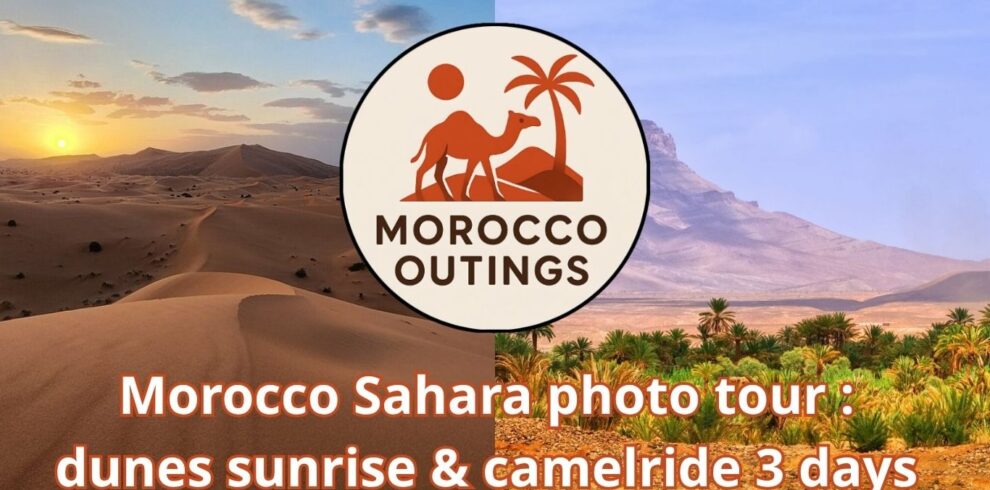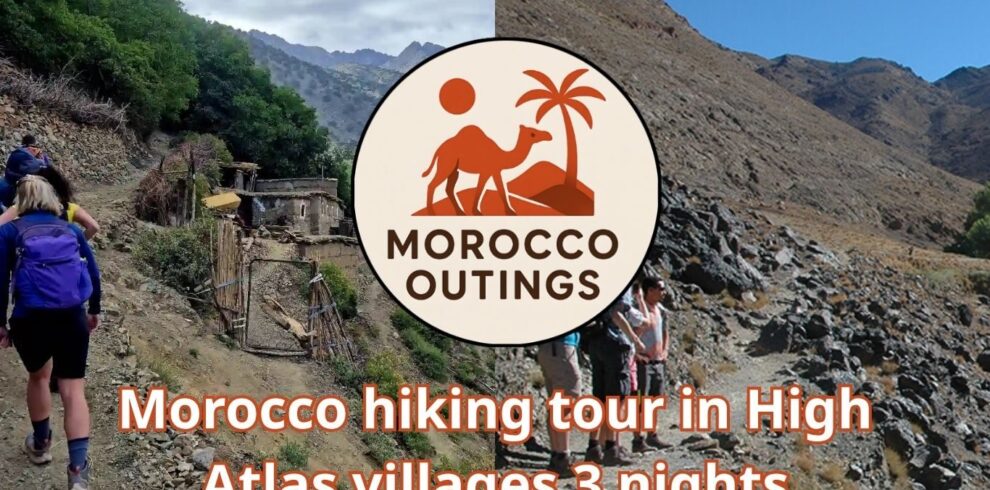4-Day Trekking in the Atlas: Desert Nights & Indigenous Culture invites you on an unforgettable journey through the heart of Morocco’s most awe-inspiring landscapes. From the bustling energy of Marrakech to the tranquil heights of the High Atlas Mountains, this immersive adventure blends nature, culture, and tradition into one seamless experience. Over four remarkable days, you will trek across scenic trails, discover ancient Berber villages, and witness the harmony between mountain life and desert serenity.
Your expedition begins as you ascend the rugged paths of the Atlas range, where every step reveals terraced fields, rushing streams, and the warm smiles of the Amazigh people. Guided by locals, you’ll experience genuine hospitality in traditional guesthouses, savor home-cooked meals, and learn about time-honored customs that have endured for generations. As the trails wind deeper into the valleys, the journey transitions from lush foothills to the mystical edge of the desert, where golden sands stretch beneath a canopy of stars.
Evenings bring magic — from storytelling by the fire to the rhythmic beats of traditional drums beneath the desert sky. You’ll rest in authentic desert camps, taste aromatic Moroccan cuisine, and feel the silence of nature embracing you. Beyond the physical adventure, this trek is a cultural encounter — a chance to connect with indigenous roots, discover sustainable mountain living, and embrace the soulful beauty of Morocco’s landscapes.
By the time you return to Marrakech, the memories of mountain trails, desert nights, and heartfelt encounters will remain etched in your spirit — a timeless reminder of Morocco’s living heritage and the boundless wonder of its Atlas wilderness.
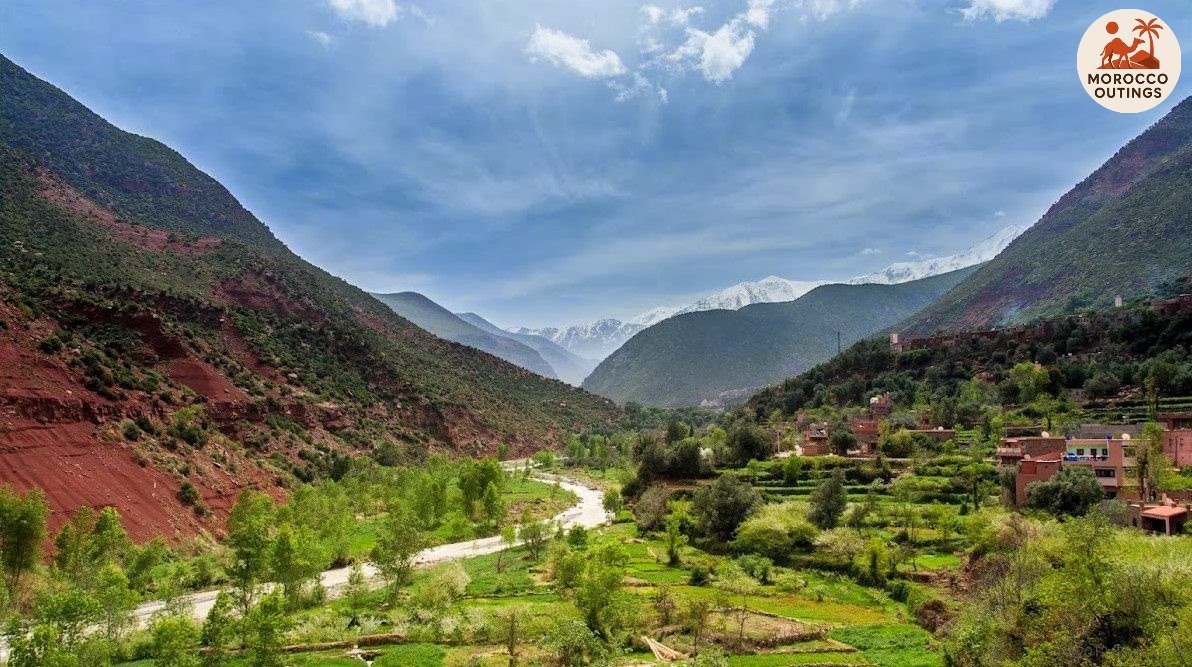
4-Day Trekking in the Atlas Desert Nights & Indigenous Culture
Tour Overview
Embark on a thrilling 4-Day Trekking in the Atlas Desert Nights & Indigenous Culture. Explore the majestic Atlas Mountains, trek through lush valleys and terraced fields, and immerse yourself in authentic Berber village life. Spend nights under the starlit desert sky while enjoying traditional meals and storytelling. This itinerary blends adventure, indigenous culture, and serene landscapes for an unforgettable mountain experience.
Detailed Itinerary
| Day | Activity | Details |
|---|---|---|
| Day 1 | Marrakech → Imlil – Into the Heart of the High Atlas | Scenic drive from Marrakech to the mountain village of Imlil, gateway to Toubkal National Park. Meet your Berber guide, prepare your trekking gear, and start the first hike through traditional hamlets and terraced valleys before camping under the stars. |
| Day 2 | Imlil → Azzaden Valley – Trails Through Berber Villages | Continue trekking through the breathtaking Azzaden Valley with red cliffs, walnut groves, and Berber settlements. Visit local homes to experience authentic hospitality, learn about mountain life, and enjoy a picnic lunch by the river. Camp near Tizi Oussem for the night. |
| Day 3 | Tizi n’Taghrhourte Pass → Agersioual – Desert Nights & Mountain Silence | Trek across the panoramic Tizi n’Taghrhourte Pass with sweeping views of the Atlas Mountains. Experience desert winds, tranquil landscapes, and unwind around a campfire in the evening, savoring traditional Berber tagine under a star-filled desert sky. |
| Day 4 | Agersioual → Marrakech – Return with Cultural Insights | Descend scenic mountain trails to reach Agersioual Village, visiting local cooperatives producing argan oil and handicrafts. Enjoy lunch with a Berber family before returning to Marrakech, carrying memories of adventure, heritage, and serenity. |
What’s Included:
3 nights accommodation in comfortable mountain camps or lodges
Private air-conditioned transportation from/to Marrakech
Experienced Berber guide and support staff
Trekking through Toubkal National Park, Azzaden Valley, and panoramic mountain passes
Traditional Berber meals, including tagine and picnic lunches
Nights under tents with bedding and camping facilities
Entrance fees to cultural sites and cooperative visits
Tea breaks and cultural storytelling sessions
What’s Not Included:
International flights to/from Morocco
Personal drinks, additional snacks, and souvenirs
Optional activities not listed in the itinerary
Travel insurance (recommended)
Tips for guides and staff
Day 1: Marrakech → Imlil – Into the Heart of the High Atlas
Marrakech – The Journey Begins
Your 4-Day Trekking in the Atlas Desert Nights & Indigenous Culture adventure starts early in the morning as you depart from the vibrant city of Marrakech, leaving behind its lively souks and ochre-hued walls. As your vehicle winds its way out of the city, the scenery transforms dramatically — from palm groves to rolling foothills. The cool morning breeze carries the scent of olive trees, and the distant outline of the Atlas Mountains rises majestically ahead. This scenic drive offers the first glimpse of the vast natural beauty and cultural depth awaiting you over the next four days. Along the way, you’ll pass through small roadside villages where locals sell fresh oranges, honey, and handmade pottery — perfect snapshots of rural Moroccan life.
Asni Valley – Gateway to the Atlas
After about an hour and a half on the road, you reach the serene Asni Valley, known as the gateway to the High Atlas. This fertile valley, framed by walnut and apple orchards, is where the air begins to change — cooler, fresher, and filled with the earthy scent of the mountains. Here, you can take a short break for Moroccan mint tea while your guide introduces you to the day’s route and cultural background. The Berber communities of Asni are known for their warm hospitality and colorful weekly markets. You’ll get a first-hand look at traditional mud-brick architecture, women in vibrant shawls tending to livestock, and donkeys carrying goods along narrow paths — scenes that seem untouched by time.
Imlil Village – Meeting the Mountains
Continuing upward, the road narrows and climbs towards Imlil, a picturesque mountain village nestled at 1,740 meters and often called the gateway to Toubkal National Park. Upon arrival, you’ll meet your local Berber guide and mule handlers who will accompany you throughout the trek. Take a moment to prepare your gear, adjust your packs, and sip another cup of tea as the crisp mountain air awakens your senses. Before setting off, your guide will brief you on safety, trail etiquette, and the cultural customs of the region — a key aspect of responsible trekking in the Atlas.
Once ready, the journey on foot begins. The trails around Imlil wind through terraced fields, fruit orchards, and stone-built homes that cling to the slopes. You’ll pass children playing near mountain streams and women washing clothes in cool spring water — authentic glimpses into daily life in the Amazigh highlands.
Toubkal National Park – Trekking the Trails
Your first real trekking experience unfolds within the protected landscapes of Toubkal National Park, home to North Africa’s highest peak, Mount Toubkal (4,167 m). The path ascends gradually, following ancient mule tracks shaded by walnut trees. As you hike, your guide will share stories of Berber legends and the symbiotic relationship between the people and their rugged environment. You’ll stop for a picnic lunch along the way, enjoying freshly baked bread, olives, and seasonal fruits while admiring breathtaking views of the valley below.
Keep your camera ready — the contrasts of snow-dusted peaks, red-earth villages, and blue skies create an ever-changing palette. Depending on the season, shepherds may pass with their flocks, and the sound of distant bells adds to the tranquil rhythm of mountain life.
Berber Hamlets – Authentic Encounters
In the afternoon, you’ll reach small Berber hamlets such as Aroumd or Tagadirt, clusters of earthen houses where time moves slowly. Here, you can stop to interact with villagers, learn about traditional Amazigh weaving or olive oil pressing, and perhaps share a glass of mint tea in a family home. Every encounter reveals another layer of the region’s indigenous culture — humble, generous, and deeply connected to the land.
Your guide may lead you along narrow paths that overlook cascading irrigation channels, locally called seguias, that nourish the terraced farms. You’ll sense how generations of mountain dwellers have mastered harmony with their environment — a living heritage that defines the Atlas.
Camping Under the Stars – Desert Nights Experience
As the afternoon sun dips behind the peaks, you arrive at your first campsite, set in a quiet valley or open plateau depending on the season. Your camp crew prepares a hearty dinner — fragrant tagine simmered over coals, served with fresh bread and hot tea. As dusk deepens, the temperature cools and the stars begin to appear, one by one, until the entire sky becomes a brilliant dome of light.
Around the campfire, you can share stories with your guide and porters, listen to the soft beats of Berber drums, and experience the deep silence of the Atlas night — a silence broken only by the crackle of fire and the whisper of mountain wind. It’s a moment of reflection and connection — to nature, to culture, and to the timeless rhythm of Morocco’s highlands.
Tonight, you sleep under canvas tents, surrounded by the scent of cedar and the distant call of night birds — the perfect end to your first day of trekking in the Atlas Mountains.
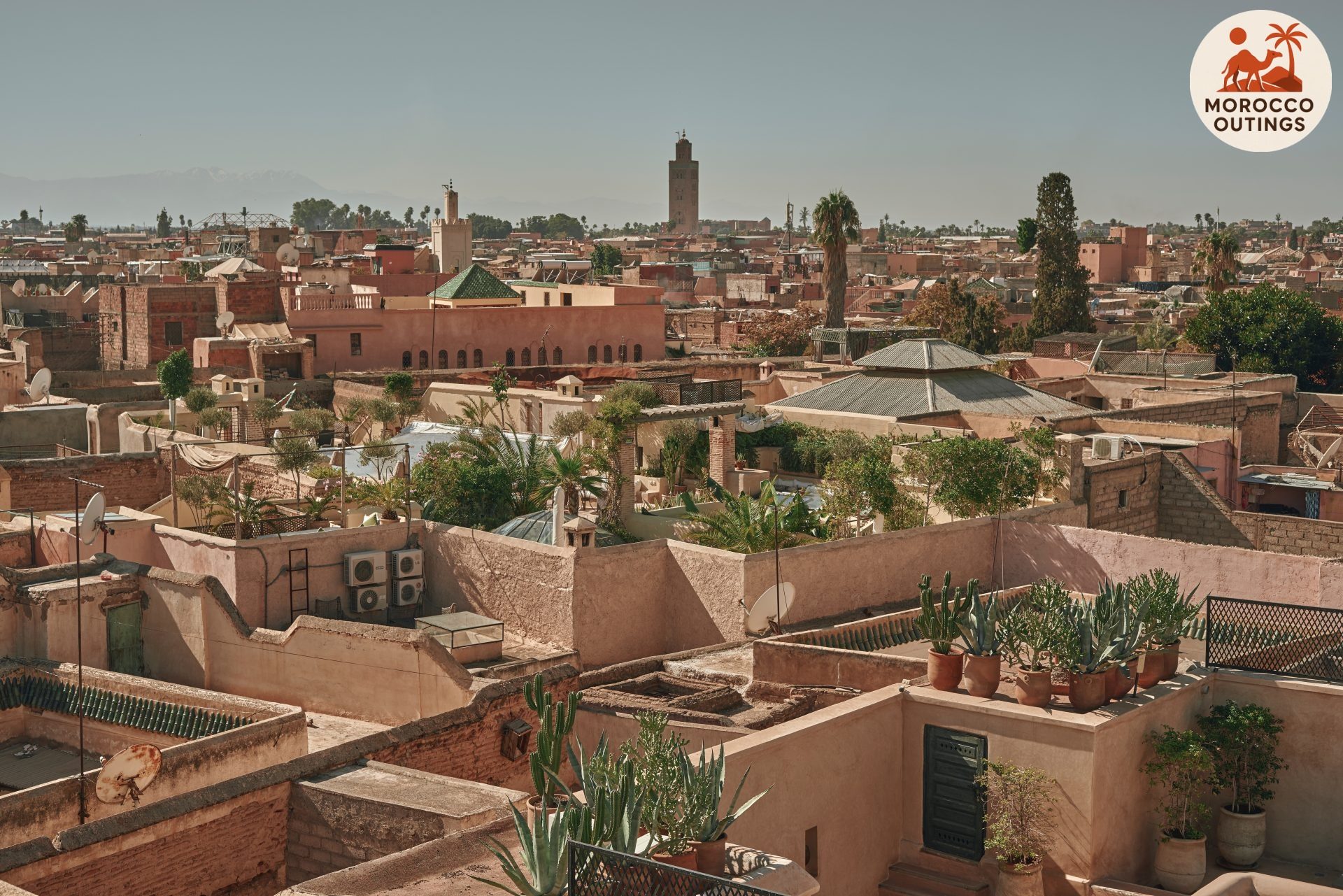
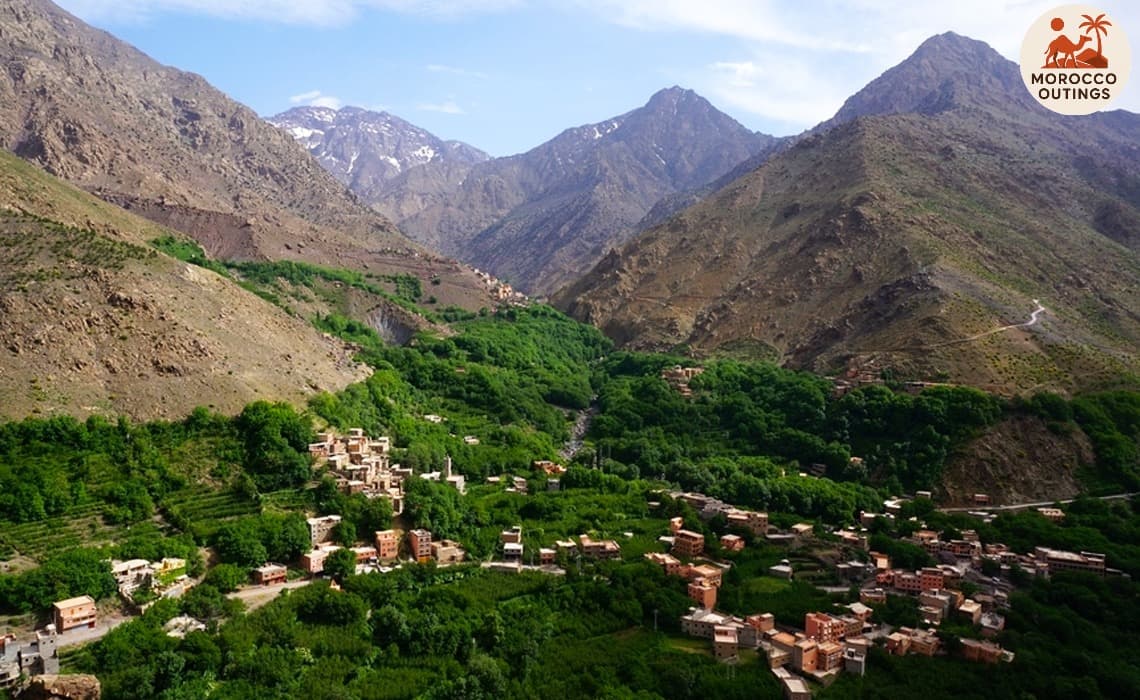
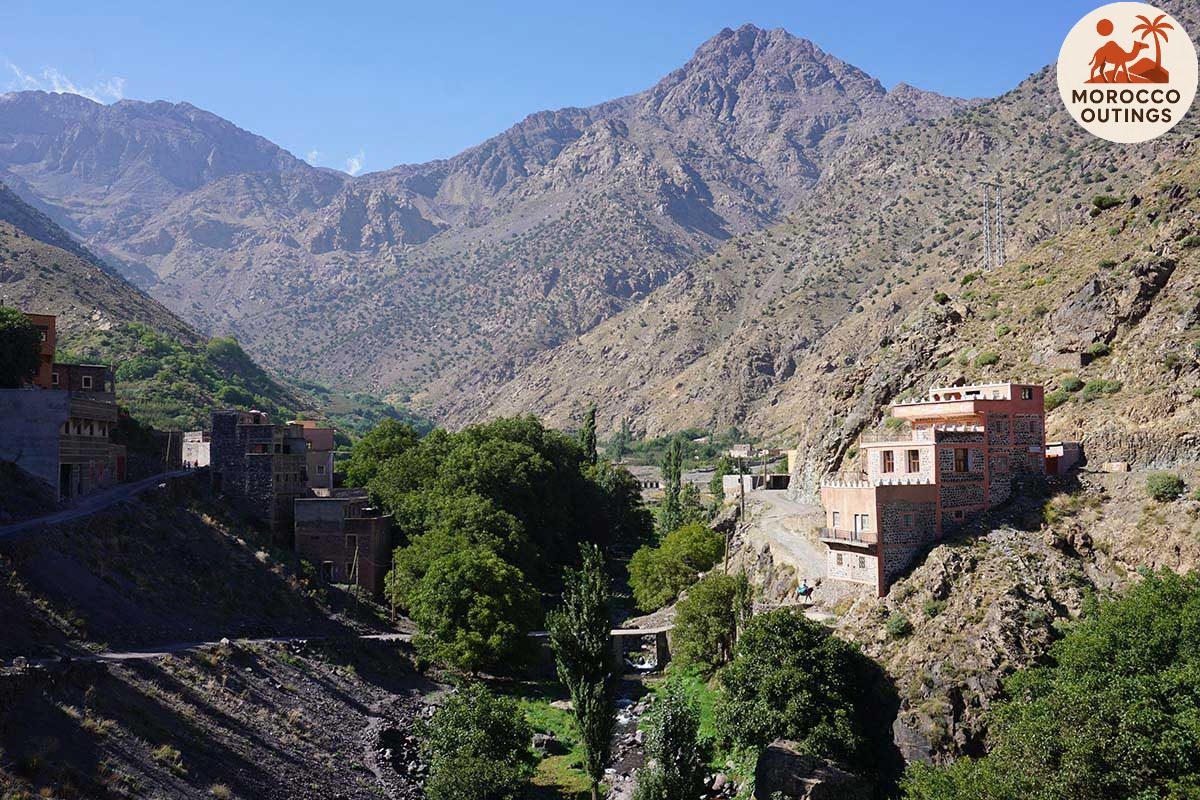
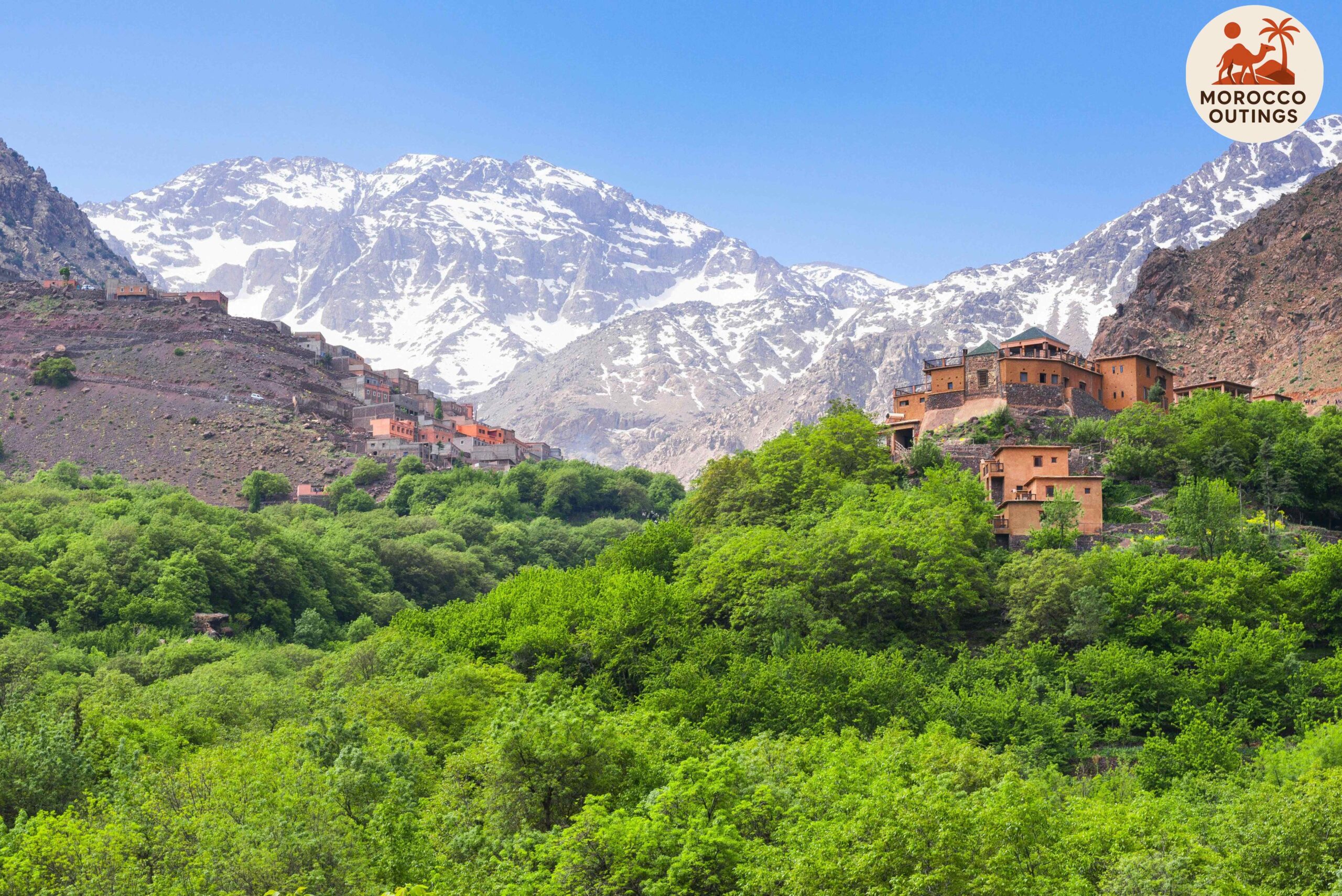
Day 2: Imlil → Azzaden Valley – Trails Through Berber Villages
Morning in Imlil – Awakening to the Mountains
The second morning of your 4-Day Trekking in the Atlas Desert Nights & Indigenous Culture begins with the first rays of sunlight casting golden hues over Imlil. The crisp air carries the scent of cedar and juniper trees, mingled with the faint aroma of baking bread from nearby homes. After a traditional breakfast of freshly baked msemen, local honey, and mint tea, you’ll meet your Berber guide to review the day’s route through the legendary Azzaden Valley. The pack mules are loaded, tents are folded, and the soft jingle of their bells marks the start of another day of exploration in the High Atlas Mountains.
As you leave Imlil, the village gradually disappears behind terraced orchards and stone paths, replaced by sweeping mountain vistas. The trail ascends gently, passing walnut groves and irrigation channels that feed the fertile valley below. Every turn reveals a new perspective of the rugged terrain, where snow-capped peaks glisten above sun-warmed slopes.
The Red Slopes of the Azzaden Valley – Entering the Heart of the High Atlas
After about two hours of steady trekking, you’ll reach the dramatic entrance of the Azzaden Valley, one of the most breathtaking landscapes in the region. The valley is framed by steep, red-ochre cliffs and dotted with clusters of traditional Berber villages built from the very earth that surrounds them. The contrast between the red soil, green terraces, and blue sky creates a striking palette — a living canvas that defines the Atlas Mountains.
Your guide will lead you along narrow paths that wind between almond trees and small farms. The rhythmic sounds of shepherd bells echo in the distance, and you may encounter farmers tending to their fields with wooden tools passed down for generations. Here, time moves slowly; daily life follows the natural rhythm of the sun and the seasons. You’ll pause often — not from exhaustion, but to take in the serenity and raw beauty of this remote landscape.
Berber Villages – Cultural Encounters and Daily Life
Mid-morning brings your arrival at one of the small Berber hamlets such as Tizi Zougaghen or Ait Aissa. These settlements, built from clay and stone, cling to the mountainsides in perfect harmony with nature. Here, you’ll experience genuine Amazigh hospitality as local families welcome travelers into their homes with a warm smile and a steaming glass of mint tea.
Inside, the aroma of wood smoke and freshly baked bread fills the air. You’ll sit on colorful woven rugs while your guide translates stories about ancestral customs, family life, and sustainable farming methods. It’s a rare chance to glimpse the unfiltered essence of mountain culture — simple, spiritual, and deeply rooted in respect for the land. You might even witness women weaving bright woolen carpets or baking flatbread in outdoor clay ovens, skills passed through generations of Berber women.
Before continuing, take a moment to step outside and admire the view — terraced fields descending toward the valley floor, snow-touched peaks above, and the tranquil murmur of the river below. These villages are not just stops on your trek; they are living museums of a civilization that has thrived in the Atlas Mountains for centuries.
Lunch by the River – Serenity in the Azzaden Valley
As midday approaches, you’ll descend gently toward the Azzaden River, where a shaded grove of walnut trees provides the perfect spot for lunch. The camp crew prepares a fresh picnic — crusty bread, grilled vegetables, olives, cheese, and seasonal fruits — all sourced from local farms. The cool sound of running water and the rustle of leaves create a soothing rhythm, a reminder of the valley’s vitality.
Take time to rest your legs, remove your boots, and soak your feet in the icy mountain stream — a refreshing ritual after the morning trek. For those who enjoy photography, this setting offers a dreamlike backdrop of reflections, colors, and light. It’s also a moment to simply breathe and appreciate the balance between adventure and peace that defines this journey.
Tizi Oussem – Mountain Life at Its Purest
In the late afternoon, you’ll continue along the ascending path toward Tizi Oussem, a charming mountain village perched at 1,850 meters. The route offers spectacular panoramic views of the Azzaden Valley, dotted with walnut groves and small farming terraces carved into steep hillsides. Along the way, you may encounter herders guiding goats and mules returning from the pastures, their silhouettes framed by the golden glow of the setting sun.
Upon arrival in Tizi Oussem, you’ll be greeted by the sight of traditional stone houses and the gentle hum of daily life. Here, villagers still rely on natural springs for water and cultivate crops using ancient irrigation systems. As the evening light softens, your camp is set up on a nearby plateau overlooking the valley.
Dinner is a feast of flavors: slow-cooked lamb tagine, couscous, and sweet mint tea. The fire crackles as your guide shares stories of Atlas legends — of mountain spirits, nomadic routes, and the resilience of the Amazigh people. As night falls, the stars illuminate the valley once more, their brilliance mirrored in the stillness of the mountains.
Under the Stars – The Silence of the Atlas Night
You end your second day surrounded by pure mountain silence, beneath a canopy of countless stars. The only sounds are the gentle flow of the river and the soft wind rustling through the walnut trees. Wrapped in the peaceful embrace of Tizi Oussem, you drift to sleep in your tent, knowing that tomorrow holds new trails, new stories, and a deeper connection to Morocco’s High Atlas wilderness.
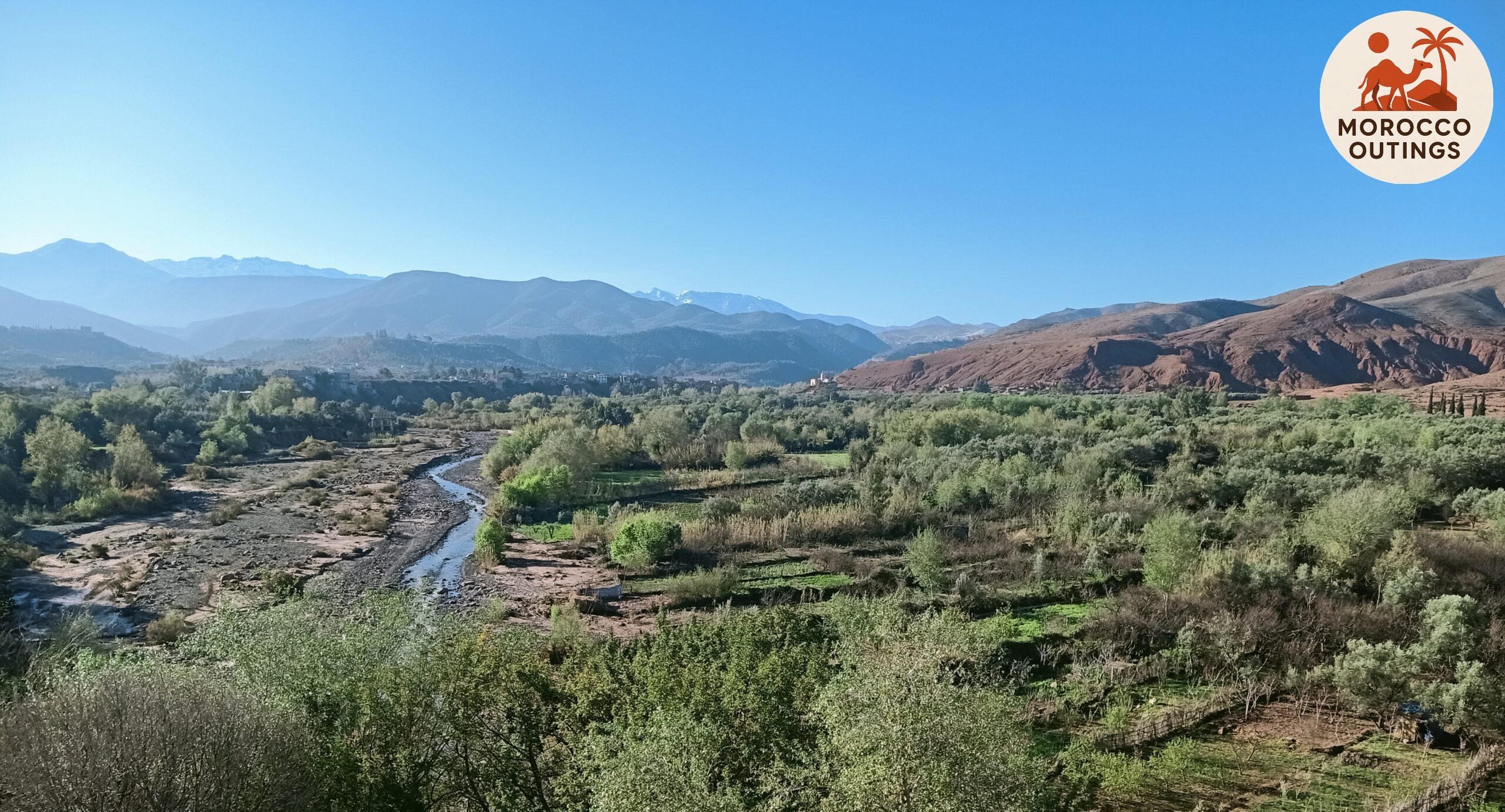
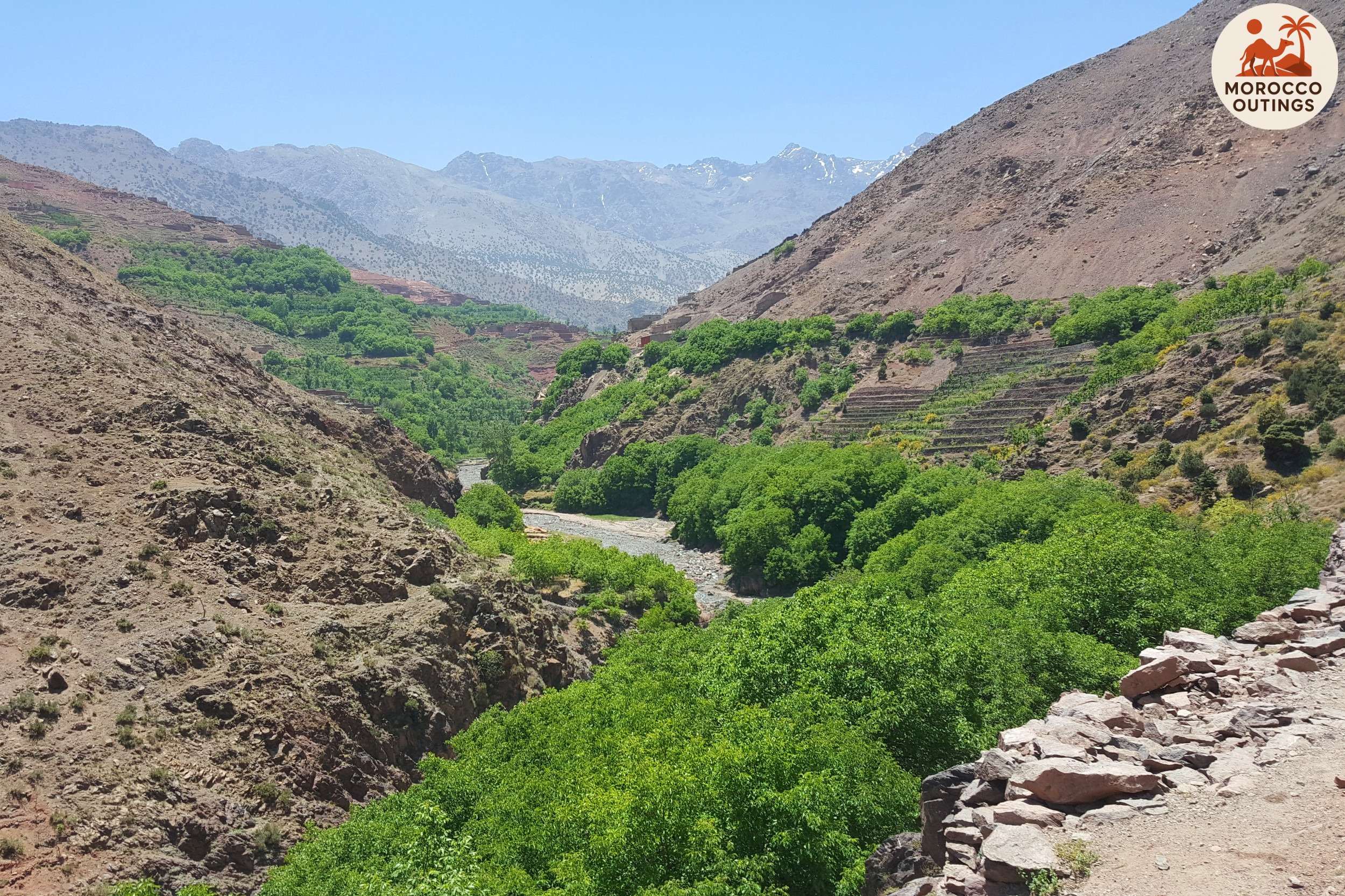
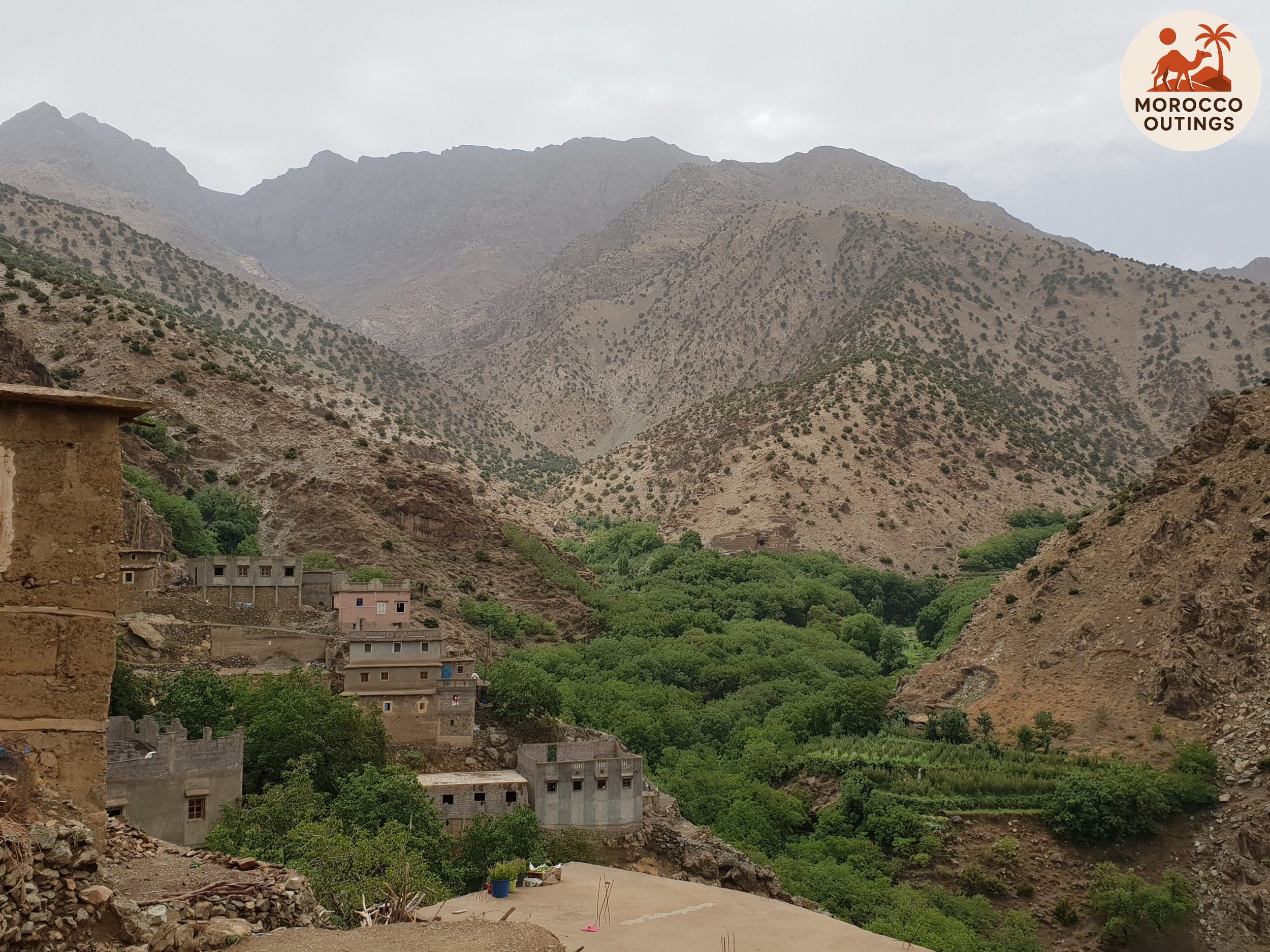
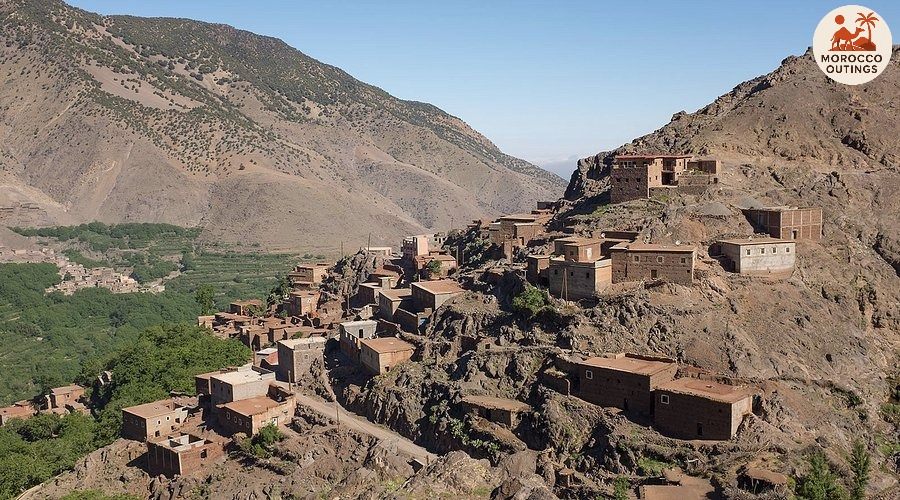
Day 3: Tizi n’Taghrhourte Pass → Agersioual – Desert Nights & Mountain Silence
Morning in Tizi Oussem – Preparing for the Ascent
The third day of your 4-Day Trekking in the Atlas Desert Nights & Indigenous Culture begins with the gentle sounds of dawn in Tizi Oussem. The air is cool, carrying the scent of wet earth and burning cedar from nearby homes. As the first rays of sunlight strike the peaks, your camp comes alive — mules being loaded, tea being poured, and travelers stretching in the crisp mountain air. After a nourishing breakfast of fresh bread, olive oil, and local honey, your Berber guide outlines the route toward the Tizi n’Taghrhourte Pass, one of the most scenic crossings in the High Atlas Mountains.
Before departure, you take a final glance at the peaceful valley below — terraces carved like steps of history, walnut groves gleaming with dew, and distant trails winding into the horizon. This day will test endurance, but reward you with silence, solitude, and views that seem to stretch into infinity.
The Ascent to Tizi n’Taghrhourte Pass – A Journey Through Altitude and Stillness
Leaving Tizi Oussem, the trail climbs steadily through a series of switchbacks. The rhythm of your steps, the soft clinking of mule bells, and the mountain breeze create a meditative pace. As you gain altitude, the landscape transforms — the green terraces give way to rocky ridges and wild herbs that release sharp, earthy fragrances when brushed by your boots.
Your guide leads you along narrow paths cut into the mountainside, occasionally stopping to point out rare alpine plants and explain their traditional uses in Amazigh medicine. The higher you climb, the more the world opens up: valleys merge into one another, and distant peaks glimmer under the mid-morning sun.
At approximately 2,300 meters, you reach the Tizi n’Taghrhourte Pass, a natural balcony offering breathtaking views of the Atlas Mountains on one side and the Agafay Desert’s dry contours on the other. Here, the boundary between mountain and desert blurs — the air thins, the wind grows dry, and silence becomes almost sacred.
You’ll take a break at the summit, sipping mint tea prepared over a small flame, while your guide shares tales of ancient trade routes that once connected Marrakech with the valleys beyond. This is a perfect time for photography, capturing the interplay of colors — ochre cliffs, silver scree, and cobalt skies — that define the soul of the Atlas.
Descent Toward Agersioual – Meeting the Desert Wind
After absorbing the view, the trail begins its descent toward Agersioual, a hidden village nestled in a valley where mountain ridges meet the whispering breath of the desert. The terrain shifts once more — soft soil underfoot turns to gravel and sand, and the warmth of the southern wind replaces the mountain chill. Along the way, you may encounter shepherds guiding their flocks across narrow ridges or women gathering herbs used in cooking and healing.
You’ll stop for a picnic lunch in the shade of an old juniper tree, with sweeping views of the descending valleys below. The meal is simple yet nourishing — fresh vegetables, lentil salad, olives, cheese, and oranges — a perfect balance for trekkers. After lunch, there’s time for rest and quiet reflection. The only sounds are the rustling leaves and the distant echo of mule hooves.
As you continue, the path weaves through arid slopes dotted with wild thyme, and the scent of the earth changes — drier, warmer, infused with a faint desert spice. The transition from alpine freshness to arid stillness marks one of the most striking contrasts of the Atlas trekking experience.
Agersioual Village – Between Mountain and Desert
By mid-afternoon, you arrive in Agersioual, a small Berber settlement where stone houses blend seamlessly into the ochre landscape. Here, life unfolds in rhythm with the land — children herd goats, elders sit in shaded courtyards weaving baskets, and smoke rises from clay ovens as evening meals are prepared.
You’ll be welcomed by villagers who offer tea and share stories about life in the Atlas foothills, where agriculture depends entirely on mountain springs and rainfall. Take a gentle walk around the village, observing the terraced gardens and the network of irrigation channels known as seguias, masterpieces of ancient engineering that still sustain the community today.
This is also a perfect moment to immerse yourself in Berber hospitality — perhaps sharing bread with a local family or joining them in preparing Amazigh tea, brewed strong and sweet to celebrate friendship and peace. The authenticity of this encounter leaves a lasting impression — simple moments of human warmth amid vast, timeless mountains.
Evening Camp – Desert Nights & Mountain Silence
As sunset paints the ridges in shades of gold and crimson, your camp is set up near Agersioual, overlooking the valley where the mountains fade into the horizon. The air cools quickly, and the desert wind begins to whisper through the rocks. Around the campfire, your Berber hosts prepare a traditional tagine — lamb, vegetables, and saffron simmering slowly over glowing coals.
The night deepens, and the sky transforms into a vast ocean of stars. Away from the cities, every constellation gleams with clarity. The campfire flickers softly, casting warm light on faces gathered in a circle of stories and laughter. Your guide may share tales of Atlas spirits and ancient caravans, blending myth and memory beneath the cosmic dome.
When the embers fade, you retreat to your tent, wrapped in silence so complete that you can hear the rhythm of your own breath. This is the essence of the Desert Nights & Mountain Silence — a perfect harmony between rugged wilderness and peaceful introspection.
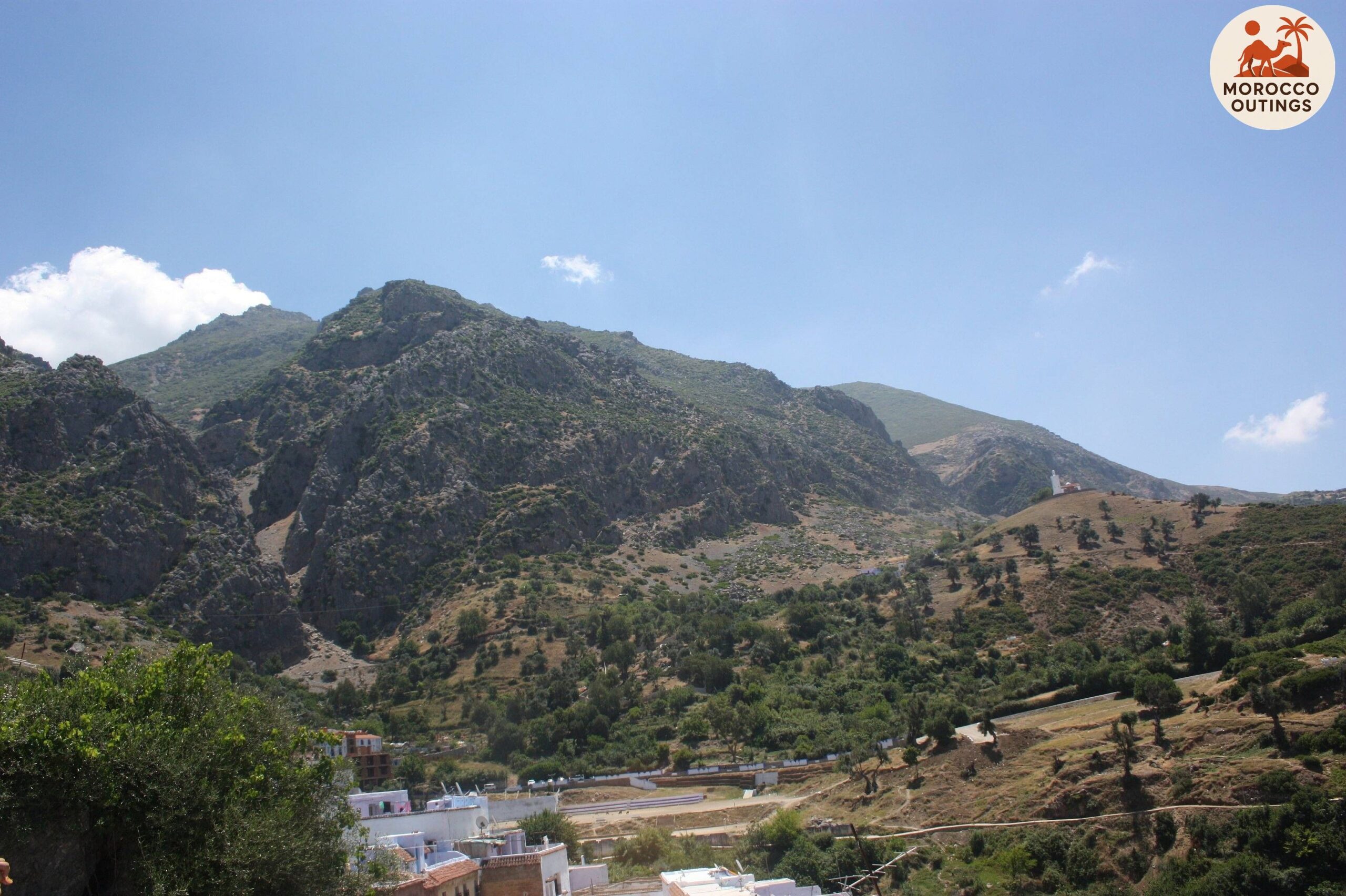
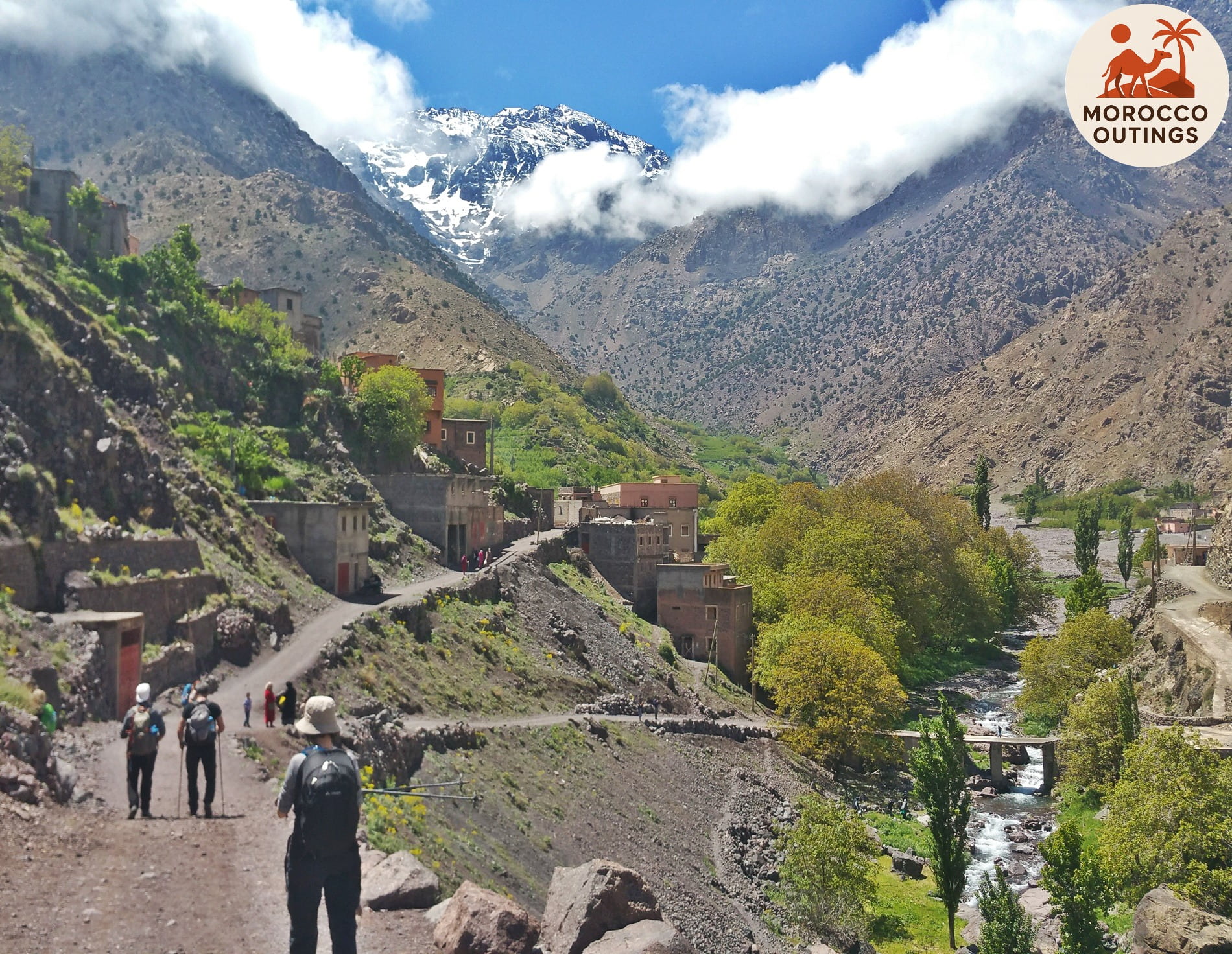
Day 4: Agersioual → Marrakech – Return from the Atlas with Cultural Insights
Morning in Agersioual – A Farewell to the Mountains
The final morning of your 4-Day Trekking in the Atlas Desert Nights & Indigenous Culture dawns quietly over Agersioual, where the first light spills across stone rooftops and terraced fields. The mountain air is crisp, the valley still wrapped in a veil of mist, and the soft jingling of mule bells signals the start of the day. Breakfast is served outdoors — warm Berber bread, local honey, and steaming mint tea — as the scent of wild thyme drifts from the hillsides.
Before setting out, your Berber guide reviews the descent route, tracing the winding path that will take you through scenic valleys and down toward the plains. It’s a moment of calm reflection before departure — the kind where every sound, from birdsong to the rustle of leaves, feels like part of the mountain’s farewell.
With your gear packed and mules ready, you take one last look at Agersioual, a place that embodies the quiet strength and beauty of the Atlas Mountains. The trek begins with a gentle descent through narrow trails that meander between walnut groves and small irrigation channels glistening with morning dew.
Mountain Trails – The Descent Through the Valleys
The path leads gradually downward, offering a final panorama of the High Atlas in all its grandeur. The sun climbs higher, illuminating rugged peaks and distant ridges that fade into the horizon. Along the way, you’ll pass shepherds tending their flocks and women carrying baskets of herbs or bundles of firewood. The scent of wild rosemary and sage fills the air, blending with the earthy aroma of sun-warmed soil.
Your trekking pace slows as you take in the details — dry-stone walls that line the paths, terraced gardens carved with ancient precision, and the rhythmic murmur of water running through handmade seguias. Every step downward is a return to civilization, but also a deepened connection to the mountain culture you’ve experienced.
There’s time for quiet stops to rest and reflect. Your guide might point out local flora, explaining how mountain dwellers use plants for traditional medicine and cooking. The trail eventually opens to a breathtaking view of the lower valleys, dotted with small farms and scattered almond trees. The Atlas Mountains recede behind you, but their spirit seems to follow, etched into every contour of the land.
Cultural Encounters – The Women’s Cooperatives of Agersioual
By mid-morning, you arrive once again at Agersioual Village, this time not as a traveler passing through, but as a guest invited to discover its cultural treasures. The village is home to several women’s cooperatives, where local artisans produce argan oil, handwoven textiles, and traditional crafts using ancestral techniques.
Inside the cooperative, you’ll witness the entire process of argan oil production — from the careful cracking of the nuts to the slow, rhythmic grinding that releases the golden liquid Morocco is famous for. The women explain how each batch is handmade and how this cooperative work empowers them economically while preserving cultural heritage. You’ll have the chance to sample freshly pressed oil and even purchase small bottles or handcrafted souvenirs — authentic pieces that directly support the community.
Nearby, another group of artisans showcases Berber weaving and embroidery, where patterns tell stories of lineage, spirituality, and connection to the land. The atmosphere is warm and genuine, filled with laughter, pride, and the rhythmic sounds of looms in motion.
Lunch with a Berber Family – Hospitality at Its Purest
Late morning brings you to a Berber family home overlooking the valley. You’re welcomed inside with heartfelt smiles and the aroma of a home-cooked meal simmering over coals. The walls are decorated with colorful rugs, copper teapots, and handwoven baskets — symbols of everyday life in the Atlas Mountains.
Lunch is a true cultural experience: a slow-cooked vegetable tagine flavored with saffron and preserved lemons, served with freshly baked bread, followed by mint tea poured high into small glasses. As you dine together, the conversation flows naturally — stories of family traditions, mountain seasons, and how younger generations are keeping the Amazigh heritage alive.
You’ll learn about how these families live in harmony with nature — growing their own produce, conserving water, and maintaining sustainable practices long before the term “eco-living” existed. The warmth of this encounter lingers long after the meal ends; it’s a moment of shared humanity that defines the heart of Moroccan culture.
Return Journey to Marrakech – Reflections and Farewell
In the early afternoon, you bid farewell to your hosts and begin the drive back to Marrakech, descending from mountain serenity into the lively rhythm of the city. The journey takes you once more through the winding roads of the Atlas foothills, where olive groves and red-earth villages pass by like scenes from a living tapestry.
As you draw closer to Marrakech, the scenery softens — the peaks fade behind you, replaced by the wide plains that lead to the city’s palm-dotted outskirts. The transition from mountain quiet to urban energy feels symbolic: a return to modernity enriched by the timeless lessons of the mountains.
Upon arrival in Marrakech, the call to prayer echoes from minarets as the sun sets over the ochre walls. Your 4-Day Trekking in the Atlas Desert Nights & Indigenous Culture concludes not with a goodbye, but with a sense of renewal — a feeling that you’ve not only explored Morocco’s landscapes, but also touched its soul.
You carry home the scent of cedar and tea, the rhythm of mule bells, and the warmth of mountain smiles — lasting memories of adventure, heritage, and serenity woven together in the heart of the Atlas Mountains.
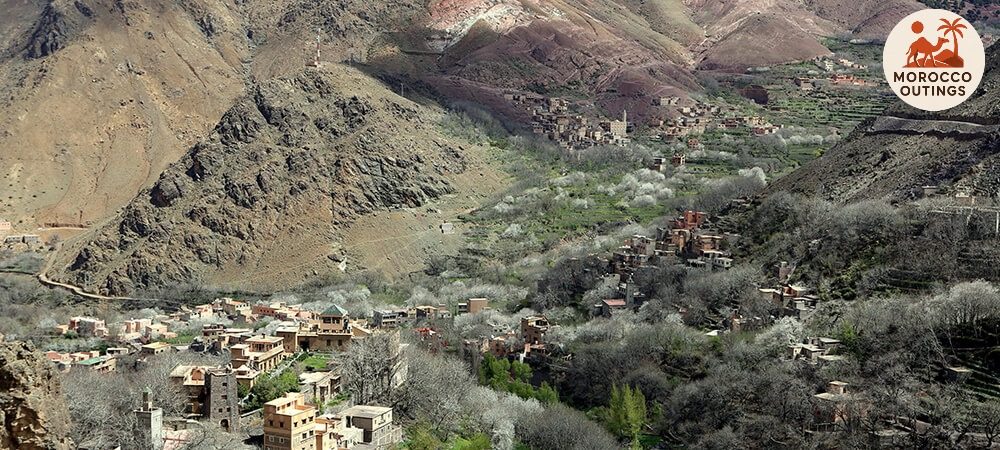
Professional Guidelines for 4-Day Trekking in the Atlas Desert Nights & Indigenous Culture
Physical Preparation
-
Ensure you are physically fit for moderate trekking, as daily hikes range between 4–7 hours with variable elevation.
-
Engage in pre-trip conditioning: walking, stair climbing, and light cardio will help your endurance on mountain trails.
-
Inform your guide of any medical conditions in advance to plan for suitable accommodations and safety measures.
Packing Essentials
-
Clothing: Layered attire is key — thermal base layers, moisture-wicking shirts, fleece jackets, and a windproof outer layer. Even in summer, nights can be cold in the Atlas Mountains.
-
Footwear: Sturdy, waterproof trekking boots with ankle support are mandatory. Bring extra socks to avoid blisters.
-
Accessories: Wide-brim hat, sunglasses, gloves, and a buff or scarf for sun protection and desert winds.
-
Backpack: Lightweight daypack with rain cover, reusable water bottles (2–3 liters per day), and hydration system if possible.
-
Camping Items: Sleeping bag rated for mountain temperatures, headlamp, personal toiletries, and a small first-aid kit.
-
Optional: Camera, trekking poles, notebook for journaling, and binoculars for wildlife or scenic viewing.
Safety Guidelines
-
Always follow your Berber guide on trails; mountain paths can be narrow and uneven.
-
Avoid trekking alone, especially in remote valleys and high passes like Tizi n’Taghrhourte.
-
Stay hydrated and consume frequent snacks to maintain energy levels during long hikes.
-
Be mindful of altitude: ascend gradually, take breaks, and report any dizziness or nausea to your guide immediately.
-
Respect local wildlife and vegetation — do not disturb plants or animals, and avoid leaving any litter.
-
In case of unexpected weather (rain, snow, or strong winds), follow the guide’s instructions carefully and carry waterproof gear at all times.
Cultural Etiquette
-
Show respect in Berber villages: dress modestly, remove shoes when entering homes, and ask before photographing locals.
-
Accept hospitality with gratitude; sharing mint tea or meals is a significant cultural gesture.
-
Engage with artisans in cooperatives or markets politely, and consider supporting local economies by purchasing authentic products like argan oil, carpets, or pottery.
-
Learn a few basic Amazigh or Arabic greetings — simple words like “Salam” (hello) go a long way in fostering friendly interactions.
Trekking & Activity Tips
-
Pace yourself during treks — enjoy the scenery rather than rushing. The High Atlas Mountains offer stunning vistas and photo opportunities at every turn.
-
Take regular breaks for hydration, photography, and observation of local wildlife and farming practices.
-
During river or valley picnics, always clean up and pack out all waste.
-
For desert nights camping, ensure tents are properly set up, sleeping bags are insulated, and warm clothing is accessible.
-
Respect campfire rules: use only designated fire areas and avoid leaving fires unattended.
Health & Hygiene
-
Bring a personal first aid kit, including blister treatment, pain relievers, bandages, antiseptic wipes, and any prescription medication.
-
Carry water purification tablets or filters if unsure of water sources along the trail.
-
Maintain hygiene: hand sanitizer and biodegradable soap are recommended during remote camping.
-
Protect yourself from sun exposure and insect bites with sunscreen, lip balm, and insect repellent.
Photography & Equipment
-
Capture the journey responsibly: landscapes, villages, and cultural encounters should be photographed with permission.
-
Protect electronic devices from dust, sand, and humidity by using waterproof cases or pouches.
-
Drones are generally restricted in local villages — check with your guide before use.
Mental & Experiential Preparedness
-
Embrace the slower pace of mountain life; appreciate small moments like village interactions, sunsets, and campfire storytelling.
-
Keep a journal or notes to record insights, sketches, or impressions from each day — a rewarding way to preserve memories.
-
Be open to unexpected weather, terrain challenges, or itinerary adjustments — flexibility enhances the overall experience.
Departure & Sustainability
-
Leave no trace: carry out all non-biodegradable waste, avoid damaging plants, and respect communal spaces.
-
Support sustainable tourism by choosing local guides, cooperatives, and eco-friendly accommodations.
-
Share your experience with others to promote awareness of the Atlas Mountains, Berber culture, and indigenous heritage.
Ready to Experience the Atlas Mountains & Desert Nights Magic?
Don’t just imagine trekking through the majestic Atlas Mountains, wandering among authentic Berber villages, and spending nights under the starlit desert sky—make it a reality! Secure your spot on the 4-Day Trekking in the Atlas Desert Nights & Indigenous Culture today and let us take care of every detail, from guided mountain treks to comfortable camps and immersive cultural experiences.
Reserve now & pay later
Free cancellation up to 24 hours
Private & fully customizable trekking experience
Your unforgettable Atlas adventure starts here—book now and step into a journey of adventure, heritage, and serenity, where breathtaking landscapes and rich indigenous culture await at every turn.
